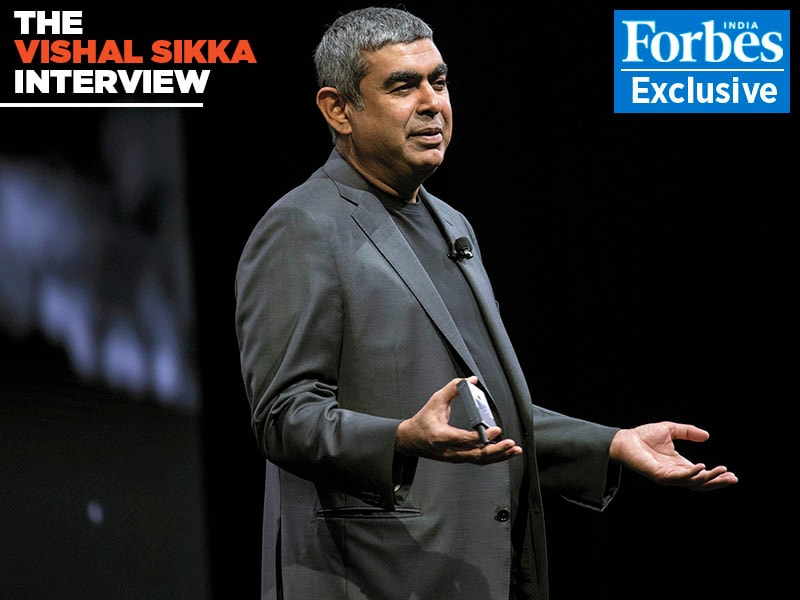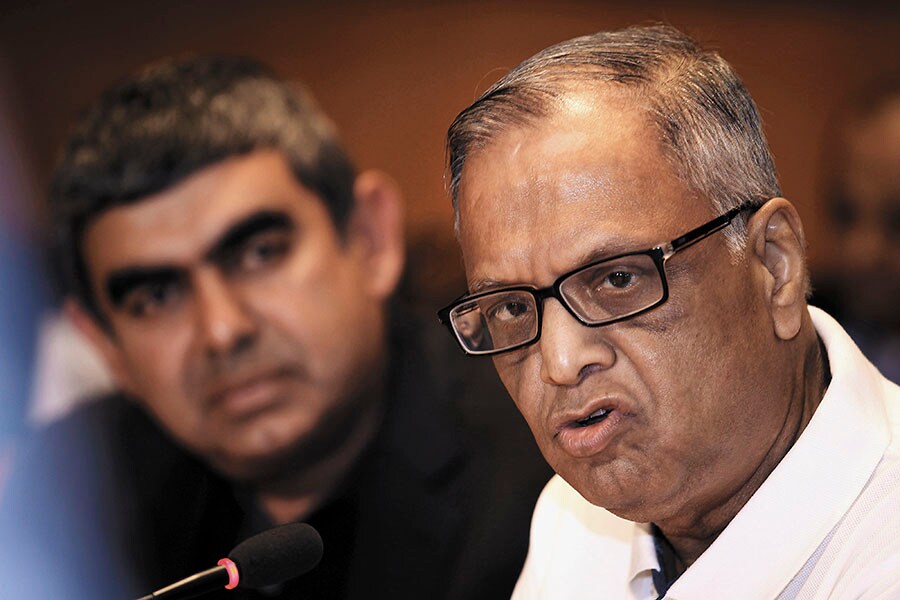It’s been an emotional roller coaster and sleepless 72 hours for Vishal Sikka after he resigned as managing director (MD) and CEO of Infosys on August 18, stunning markets. His phone has been ringing off the hook with calls from colleagues, clients and investors. It’s been impossible for him to slide out of the door without a fuss. Sikka’s sudden resignation torpedoed Infosys shares which tanked by 13 percent (intra-day) on August 18 during trading to a three-year low of
884.20 ($14.71), wiping some $4.85 billion off the No 2 Indian IT services firm’s market value.
“It is all a blur for now. I have barely slept for six hours in the last 72 hours. It was one of the hardest decisions of my life, but I feel that it had to be done,” Sikka tells Forbes India from his home in Palo Alto, in his first interview since his dramatic decision to step down.
“Recently, when I turned 50, a great friend and mentor gave me a rare book of reflections by Hermann Hesse. In it, I found this one gem: Some of us think holding on makes us strong, but sometimes it is letting go. In the end, I do believe it’s about living gracefully and letting go of things not meant for you,” says Sikka philosophically.
Despite the maelstrom, Sikka has over the past few days re-read snippets from his well-thumbed copy of Jiddu Krishnamurti’s Freedom From The Known. A favourite uncle gave Sikka the book when he first arrived on America’s shores as a homesick teen struggling with the winter cold in Syracuse. “Even Krishnamurti talks about letting go of the past so that you can embrace something new. It is freedom from the known that helps you renew yourself,” says Sikka.
In 1996, Sikka did his PhD from Stanford University in Artificial Intelligence (AI). When he struck out on his own in Silicon Valley, building his startups iBrain and Bodha (both names evoking AI), he was inspired by the meteoric rise of the “Bengaluru Tigers”, the new breed of hungry Indian tech upstarts. Naturally, Infosys co-founder and former chairman NR Narayana Murthy and Nandan Nilekani were his big heroes.
Sikka went on to build considerable street cred in Silicon Valley as a disruptor for creating German tech giant SAP’s Hana platform, but he couldn’t resist a call to work for an Indian tech giant. KV Kamath, former Infosys chairman, reeled Sikka in, but the ball only got rolling after the latter made a presentation which was brilliant for its prescriptive analysis. Murthy, who was then chairman, liked Sikka’s transformation agenda and hired him. It was a moment of quiet pride for Sikka when the IT veteran handed over the baton to him. There’s a 22-year age gap between Murthy and Sikka. And Murthy at first saw Sikka as the young blood Infosys desperately needed. Not surprisingly, Sikka had great expectations from Murthy too who he admired for many years from afar. Sikka not only expected non-interference, but also steadfast support from Murthy.
Sikka never imagined that three years after presiding over a massive overhaul at Infosys, which had started showing steady results, he would walk away from the very thing that had so dearly consumed him. Ultimately,
Sikka reached a point where the visceral personal attacks took a toll on his ability to make changes, especially some of the more fundamental and structural ones. Even more disappointed are investors as Sikka had bolstered shares of the blue chip firm. Since he took over as MD and CEO on August 1, 2014, Infosys shares had risen by more than 20 percent by August 17, 2017’s close, outpacing a 5 percent gain in India’s benchmark IT index.
The founders, who still own 12.75 percent of Infosys, have in the past questioned a pay rise granted to Sikka and UB Pravin Rao, the interim CEO and MD, even though the company has shown strong performance under their leadership. Revenues have grown from $2.13 billion in Q1FY15 to $2.65 billion this past Q1. All compensation was predominantly performance-based in the form of stock options and restricted stock, and was linked to creating shareholder value.
“We grew revenues steadily while keeping a strong focus on margins, closing this past quarter at 24.1 percent operating margin, beating some of our competitors for the first time in many years,” says Sikka. “Perhaps more importantly, our revenue per employee has grown for six quarters in a row. We’ve also increased our large deal wins from $1.9 billion in FY15 to $3.5 billion this past year.” ![mg_99019_gettyimages-450479506_master_280x210.jpg mg_99019_gettyimages-450479506_master_280x210.jpg]() Infosys co-founder NR Narayana Murthy (right) was one of Sikka’s heroes and someone he admired greatlyImage: Namas Bhojani/Bloomberg via Getty Images
Infosys co-founder NR Narayana Murthy (right) was one of Sikka’s heroes and someone he admired greatlyImage: Namas Bhojani/Bloomberg via Getty Images
In a freewheeling chat, Sikka tells Forbes India how his departure wouldn’t stall Infosys as it would continue to push into AI, automation, cloud computing and data analytics. He speaks about the path forward for himself and Infosys. Edited excerpts:
Q. Would you say that Indian promoters/founders typically find it difficult to give up control over a company after handing over the reins to professional CEOs? We saw how unceremoniously Cyrus Mistry was ousted over differences between him and the Tata family patriarch...
I don’t think we can make broad generalisations of that nature. I just want to say that if you look at the world around us, it is going through profound change. If you look at the landscape, whether it is manufacturing, retail, telecommunications, or even services, everything has undergone seismic changes on the back of new digital technologies, computing and now AI.
Companies must have an open mind to new ideas and technologies, and embrace change. Not only in what we do, but especially in also how we do things. That is extremely important. Speed, speed of change, is a fundamental aspect of the disruption around us, so we need a culture of agility and empowerment.
Q. We all know how the Infosys stock has reacted and the broad contours of analyst and investor sentiments. But have you received any feedback from employees?
I am humbled by the tremendous emotional outpouring of support that I have witnessed. In a couple of hours after the news broke, I got a few thousand messages and emails. All through the three-plus years, I have had overwhelming support from the employees and for this I am deeply grateful. Ultimately, Infosys is a people’s company and our employees make it all matter.
Q. You have presided over enormous change at Infosys by trying to turn it around from being a commoditised service provider to an innovation-driven company focussed on areas like AI. Where does your resignation leave Infosys?
I feel that we have planted a lot of seeds which are starting to sprout: Some of them are little buds, saplings, but a vast majority of them are growing into trees. These changes are structural and are now embedded in the way Infosys does things. We have embraced Design Thinking, Zero Distance programmes, AI and automation on a massive scale. Tens of thousands of people are involved and working on these things, so they will continue to advance. These changes will not only continue to grow, but will also gain momentum. There’s no turning the clock back.
Zero Distance thinking now covers 99-plus percent of the projects in the company, so it can’t be undone. We have done these projects on a massive scale, so they won’t go away. Most significantly, our own new software business is now at 1.6 percent of revenue. Our AI platform, Nia, now with 160-plus scenarios, is deployed at and used by more than 70 clients. It is helping drive both automation within the company and break through new business scenarios outside. These structural changes will not only continue to grow, but will also gain traction and momentum.
The fundamental calling for the times ahead is to transform ourselves towards being a company of innovators. I believe this is critical and I am proud of the major steps we have taken towards this. Infosys is an iconic company and it will prevail.
Q. What do you think you can do for Infosys by staying on as the executive vice chairman until the new management is in place?
The board requested that I stay after I resigned. I told them that if I am going to do this, then I don’t want any pay, and will only take a token $1 salary. As far as possible, I want to help with the transition, find a good management team to succeed me and help Pravin establish this. I also want to help institutionalise some of the initiatives and strategies, and maintain relationships with some of our key clients. [qt]Infosys is a people’s company and our employees make it all matter.”[/qt] Q. In the past, you built two successful startups: iBrain, which you sold to PatternRX, and Bodha, which you sold to Peregrine Systems. The world is your oyster, so what are your plans?
Right now I want to take some time off. I want to catch up on things that have long been neglected. I want to read books, surf a little and spend time with my family.
My big passion is AI. Ever since its early days, one of the goals in AI has been the development of general systems that can utilise the benefits of specialised reasoners. In fact, my PhD thesis on ‘Integrating Specialised Procedures into Proof Systems’ revolves around this theme. I have been fortunate to study at the feet of the masters and pioneers of AI. Marvin Minsky, one of the fathers of AI, wrote my recommendation letter for my admission to Stanford. John McCarthy—the man who coined the term and pioneered the field of AI research—was one of my teachers.
We are seeing AI going hand in hand with entrepreneurship. You can now automate routine, mundane and known processes piece by piece, until the entire pipeline is fully automated. This will continue to accelerate, even though some key breakthroughs are needed. And the big human frontier is entrepreneurship, our creativity, and our problem-finding capability. So I want to do something relating to this big emerging area relating to the AI revolution and the creative economy. I want to do something that changes the world. I don’t know what it is yet, but I am looking forward to it.
ALSO READ: ![mg_99115_insideinfy1px_280x210.jpg mg_99115_insideinfy1px_280x210.jpg]()
- Two sides of the Infosys coin
- It's critical for Infosys to be a company of innovators: Vishal Sikka
- Nilekani's return brings positivity but does not resolve strategic dilemma: Everest Group CEO
- Infosys to undertake 'a very wide global search' for new CEO, Nilekani says- Nandan Nilekani returns to Infosys as non-executive chairman
- Murthy is a hero. Yet, he faltered

 Vishal Sikka is keen to help with the transition process and find a good management team to succeed himImage: David Paul Morris/Bloomberg via Getty Images
Vishal Sikka is keen to help with the transition process and find a good management team to succeed himImage: David Paul Morris/Bloomberg via Getty Images Infosys co-founder NR Narayana Murthy (right) was one of Sikka’s heroes and someone he admired greatlyImage: Namas Bhojani/Bloomberg via Getty Images
Infosys co-founder NR Narayana Murthy (right) was one of Sikka’s heroes and someone he admired greatlyImage: Namas Bhojani/Bloomberg via Getty Images